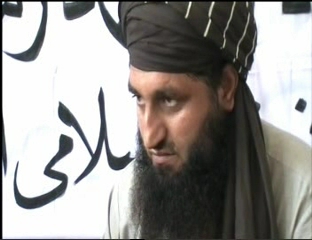|
|
|
Mullah Munibullah, the Taliban’s military commander for Nuristan province. |
A top Taliban commander in eastern Afghanistan denied that a wanted Pakistani Taliban leader was killed in fighting in the region.
Mullah Munibullah, the Taliban’s military commander for Nuristan, denied that Mullah Fazlullah, the Taliban leader of the district of Swat in Pakistan, was killed during clashes along the border region. Munibullah said that while Fazlullah had been in the region, he was no longer there and would not have led a military attack regardless.
“There is no truth in Afghan government claims and media reports that Maulana Fazlullah-led Pakistani Taliban attacked some posts of the Afghan army and police at Barg-e-Matal,” Munibullah told The News. “I am military commander of Nuristan province and no such incident happened here.”
“It is almost impossible for an outsider like Maulana Fazlullah to raise a group of 300 militants in Nuristan and attack security posts,” Munibullah continued in his interview with The News. “Except us, no other Taliban group can operate here. We have stopped attacking the Afghan army and police here in Nuristan after the US forces vacated their outposts. We signed agreement with the local tribesmen in which we promised them we would not fight against local forces.”
While Pakistani Taliban and al Qaeda and other jihadist groups often take shelter with and fight with the Nuristani Taliban, they do not typically lead operations in the region, US intelligence officials told The Long War Journal.
Afghan officials are now backing off initial claims that Fazlullah was killed in a clash with border police on May 25 along with six other fighters. Earlier that day, reports indicated that Fazlullah led a force estimated at between 300 and 500 Pakistani fighters in an assault on the district center in Barg-e-Matal. The Afghan police, backed by local Nuristanis, repelled the attack.
Fazlullah controlled Swat in northwestern Pakistan from 2007 until May 2009, when the Pakistani military ousted the Taliban from the region after the group encroached on districts near Islamabad.
In October 2009, Munibullah, along with Dost Mohammed, the shadow governor of Nuristan, led the Taliban and al Qaeda assault on Combat Outpost Keating in the Kamdish district of Nuristan province. US troops withdrew from the base weeks later, allowing the Taliban to claim a propaganda victory.
Munibullah admitted during an interview in 2007 that his forces operate closely with al Qaeda and other Central Asian jihadist groups.
“We are all one now with a common enemy,” Munibullah told NBC in the interview. “Everyone – the Arabs, the Uzbeks, the Tajiks and the Chinese – have all accepted Mullah Omar as the supreme leader and we all fight together.”









3 Comments
This guy sounds like a US politician:
“I am military commander of Nuristan province and no such incident happened here.”
I get the denial of the reported description of the incident. So, Mr. Taliban, what did happen?
And like other administrators he’s remote from the actual event and probably has less than ideal comms with the attacking group (our SIGINT and ELINT would be helpful in finding the group). He may have minimal info (second hand, perhaps) that Fazlullah is OK but no more details than that.
It would be odd that in a 300 person attack (repelled by 7 Aghani police and the local lashkar) failed and they lost 7 people and one of them just happened to be a leader who I rather doubt leads from the front (like Nelson say).
But I suspect over time the Fog of War will lift and we’ll find out for sure.
We will find out. In fact what I like, is that the Tali’s pad their numbers while we dont have to. In fact we talk about numbers so small, that it is in fact devastating to the Tali’s to the public; who cares, we killed 11 but what if that number was 11 fold? We need no padding because we know what we do. They are depserate while we are patient. they have low level Tali’s as their commaders now, what does that tell you about their structure???